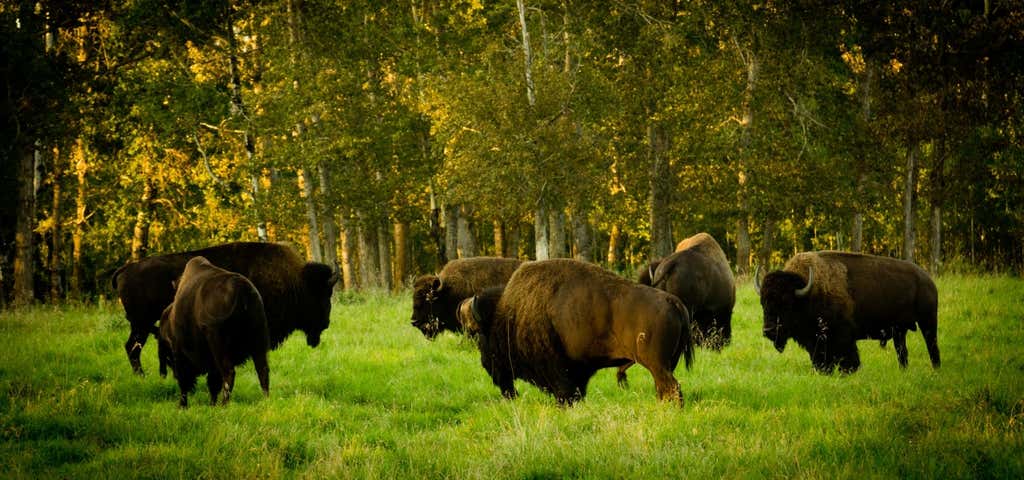“protecting one of the most amazingly diverse ecosystems”
Located less than an hour away from Edmonton, Elk Island National Park of Canada protects the wilderness of the aspen parkland, one of the most endangered habitats in Canada. This beautiful oasis is home to herds of free roaming plains bison, wood bison, moose, deer, and elk. Also boasting over 250 species of birds, the park is a bird watcher's paradise. Be it for wildlife viewing, hiking, cross-country skiing, picnicking or overnight camping, there is something for everyone at Elk Island National Park. Celebrating over 100 years as a National Park! Elk Park was first established in 1906 as a federal game preserve to protect the declining elk populations of the Beaver Hills. Some of the last Plains Bison in the world were reintroduced to Elk Park in 1907. In 1913 Elk Park joined the Parks Canada family. Since that time Elk Island National Park has been Canada’s source of disease free bison for re-introduction and conservation initiatives throughout its former range. Join us and celebrate over 100 years of protecting and presenting our Canadian heritage! Elk Island National Park (French: parc national Elk Island), is one of 43 national parks and park reserves administered by the Parks Canada Agency. This “island of conservation” is located 35 km east of Edmonton, Alberta along the Yellowhead Highway, which nearly bisects the park. It is Canada's 8th smallest in area, but largest fully enclosed national park, with an area of 194 km². The park is representative of the northern prairies plateau ecosystem and as such, the knob and kettle landscape is a mix of native fescue grassland, aspen parkland and boreal forest. As well, Elk Island plays host to both the largest and the smallest terrestrial mammals in North America, the wood bison and pygmy shrew respectively. Elk Island National Park is situated in the Beaverhills area, which with its aspen thickets and easy access to water, has provided shelter for wintering herds of elk, bison and moose since times immemorial. Though there was never any permanent First Nations settlement in the area, there are over 200 archaeological remains of campsites and stone toolmaking sites. The land has been influenced by the Blackfoot, Sarcee and Cree peoples. In early post-Contact history, the Beaverhills area was primarily used for commercial hunting. This led to over-hunting and the virtual elimination of beaver from the area by the 1830s and of large ungulates by the 1860s. The area then became valuable for timber until 1894, when fire swept through the area. In 1899, the federal government designated the area the “Cooking Lake Forest Reserve”. But while the forest was protected, it did little to protect the moose, elk and deer populations. Thus, in 1906, five men from Fort Saskatchewan put forward $5000 and petitioned the federal government to set up an elk sanctuary, calling it “Elk Park”. Elk Island Park was later granted federal park status in 1913, and then designation as an official National Park under the National Parks Act which passed through the Canadian Parliament in 1930. In 1951, a replica of a pioneer cabin was built in the park to honour the Ukrainian-Canadians who pioneered the area. This replica, known as the Ukrainian Pioneer Home, was the first museum or historic site ever dedicated to Ukrainian immigration in Canada. In 1993 it was declared a Classified Federal Heritage Building by the federal government. Elk Island is home to the densest population of ungulates (hoofed mammals) in Canada. A variety of wildlife, including plains bison, wood bison, elk, moose, white-tailed deer, mule deer, coyotes, and beavers are year round residents, as well as over 250 bird species that can be found in the park at various times of year. Most notable among these are the Red-necked Grebe, American White Pelican, Double-crested Cormorant, Great Blue Heron, Red Tailed Hawk, American Bittern and the Trumpeter Swan.
My husband and I have been here for a day trip. Beautiful area. Groomed trails. We managed to get pictures of the bison out in the fields by the road.
There's a park access fee like all national parks, and is not free like the app suggests.
Be the first to add a review to the Elk Island National Park.
/-112.87035,53.59277,14/300x172@2x?access_token=pk.eyJ1Ijoicm9hZHRyaXBwZXJzIiwiYSI6ImNsczF1Y3RwcTA0ZmgycHAwbngweHlmbDAifQ.G6RP_RvWmMx8yNQSHb3PGQ)
Elk Island National Park
Hours
- Sun - Sat: 12:00 am - 11:59 pm
Problem with this listing? Let us know.
Has RV parking changed? Let us know.
-
Parking
-
Pets Allowed
-
Restrooms
-
Wifi
-
Wheelchair Accessible
-
Credit Cards Accepted


